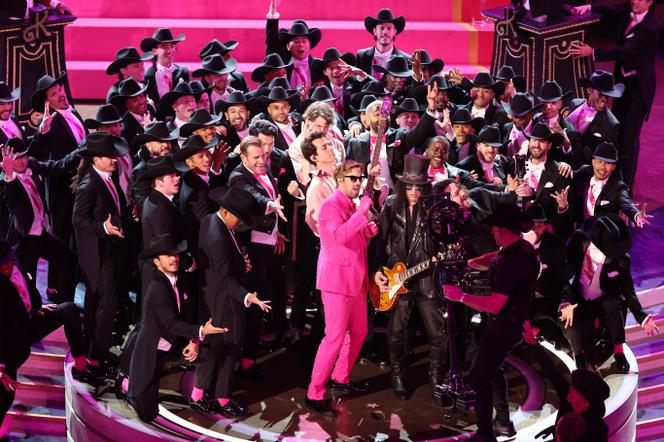

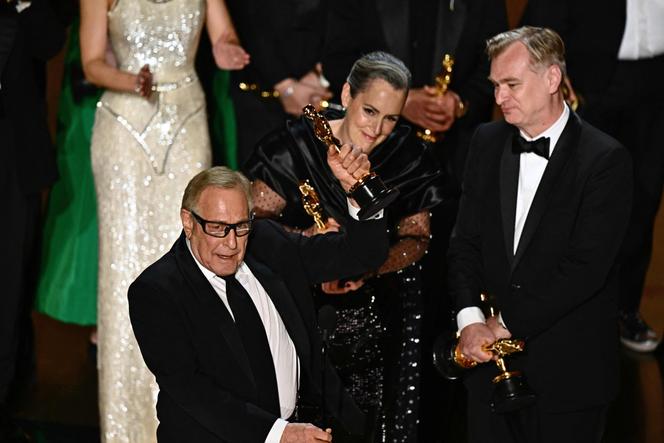
Oppenheimer, a solemn three-hour biopic that became an unlikely billion-dollar box-office sensation, was crowned Best Picture at the 96th Academy Awards, which doubled as a coronation for Christopher Nolan. After passing over arguably Hollywood’s foremost big-screen auteur for years, the Oscars made up for the lost time by heaping seven awards on Nolan’s blockbuster biopic, including Best Actor for Cillian Murphy, Best Supporting Actor for Robert Downey Jr. and Best Director for Nolan.
In anointing Oppenheimer, the Academy of Motion Pictures Arts did something it hasn’t done for more than a decade: hand its top prize to a widely seen, big-budget studio film. In a film industry where a cape, dinosaur, or Tom Cruise has often been a requirement for such box office, Oppenheimer brought droves of moviegoers to theaters with a complex, fission-filled drama about J. Robert Oppenheimer and the creation of the atomic bomb. "For better or worse, we’re all living in Robert Oppenheimer’s world," said Murphy in his acceptance speech. "I’d like to dedicate this to the peacemakers.”
As a film heavy with unease for the human capacity for mass destruction, "Oppenheimer” also emerged – even over its partner in the cultural phenomenon, Barbie – as a fittingly foreboding film for times rife with cataclysm, man-made or not. Sunday’s Oscars at the Dolby Theatre in Los Angeles unfolded against the backdrop of wars in Gaza and Ukraine and with a potentially momentous US election on the horizon.
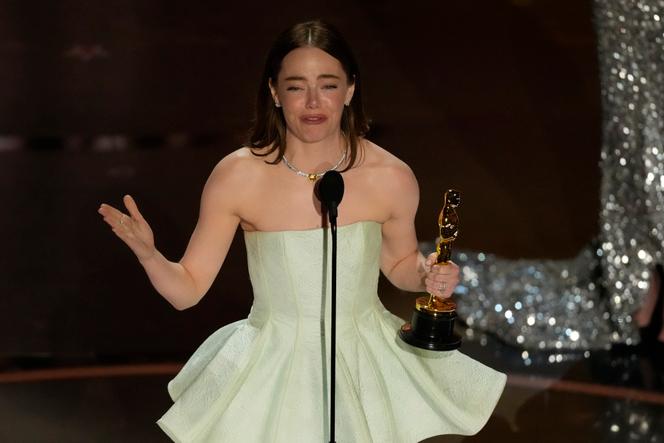
The most closely watched contest of the Academy Awards went to Emma Stone, who won Best Actress for her performance as Bella Baxter in Poor Things. In what was seen as the night's most nail-biting category, Stone won over Lily Gladstone of Killers of the Flower Moon. Gladstone would have become the first Native American to win an Academy Award. Instead, Oscar voters couldn't resist the full-bodied extremes of Stone's Poor Things performance. The win for Stone, her second best actress Oscar following her 2019 win for La La Land, confirmed the 35-year-old as arguably the preeminent big-screen actress of her generation. The list of women to win Best Actress two or more times is illustrious, including Katherine Hepburn, Frances McDormand, Ingrid Bergman, and Bette Davis. "Oh, boy, this is really overwhelming," said Stone.
Barbie, last year's biggest box-office hit with more than $1.4 billion in ticket sales, didn't win an award until almost three hours into the ceremony. It won best song (sorry, Ken) for Billie Eilish and Finneas' "What Was I Made For?" It's their second Oscar, two years after winning for their James Bond theme, "No Time to Die." But after an awards season that stayed largely inside a Hollywood bubble, geopolitics played a prominent role. Protests over Israel's war in Gaza snarled traffic around the Dolby Theatre in Los Angeles, slowing stars' arrival on the red carpet and turning the Oscar spotlight toward the ongoing conflict. Some protesters shouted "Shame!" at those trying to reach the awards.
Jonathan Glazer, the British filmmaker whose chilling Auschwitz drama The Zone of Interest won Best International Film, drew connections between the dehumanization depicted in his film and today. "Right now, we stand here as men who refute their Jewishness and the Holocaust being hijacked by an occupation which has led to conflict for so many innocent people, whether the victims of the October 7 attacks or the ongoing attack on Gaza, all the victims, this dehumanization, how do we resist?"
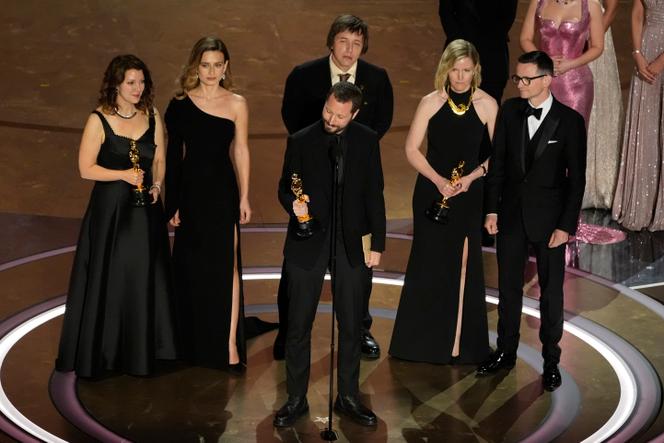
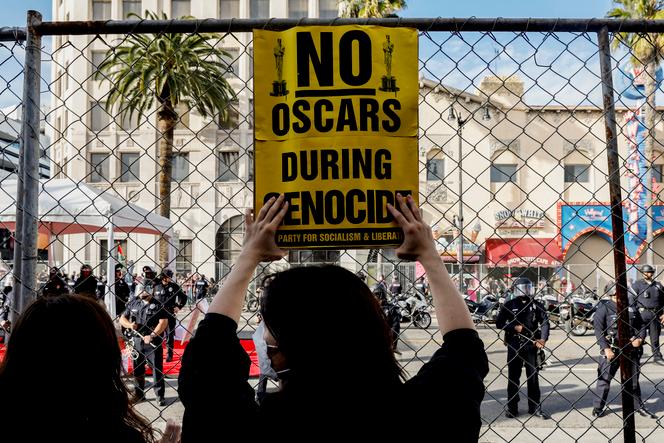
The war in Gaza was on the minds of many attendees, as was the war in Ukraine. A year after Navalny won the same award, Mstyslav Chernov's 20 Days in Mariupol, a harrowing chronicle of the early days of Russia's invasion of Ukraine, won best documentary. Mstyslav Chernov, the Ukrainian filmmaker and AP journalist whose hometown was bombed the day he learned of his Oscar nomination spoke forcefully about Russia's invasion. "This is the first Oscar in Ukrainian history," said Chernov. "And I'm honored. Probably I will be the first director on this stage to say I wish I'd never made this film. I wish to be able to exchange this (for) Russia never attacking Ukraine."
In the early going, Yorgos Lanthimos' Frankenstein-riff Poor Things ran away with three prizes for its sumptuous craft, including awards for production design, makeup, hairstyling, and costume design.
The night's first award was one of its most predictable: Da'Vine Joy Randolph for best supporting actress, for her performance in Alexander Payne's The Holdovers. An emotional Randolph was accompanied to the stage by her Holdovers co-star Paul Giamatti. "For so long I've always wanted to be different," said Randolph. "And now I realize I just need to be myself." Though Randolph's win was widely expected, an upset quickly followed. Hayao Miyazaki's The Boy and the Heron won for Best Animated Feature, a surprise over the slightly favored Spider-Man: Across the Spider-Verse. Miyazaki, the 83-year-old Japanese anime master who came out of retirement to make The Boy and the Heron, didn't attend the ceremony.
The Best Original Screenplay went to Anatomy of a Fall, which, like Barbie, was penned by a couple: director Justine Triet and Arthur Harari. "This will help me through my midlife crisis, I think," said Triet.
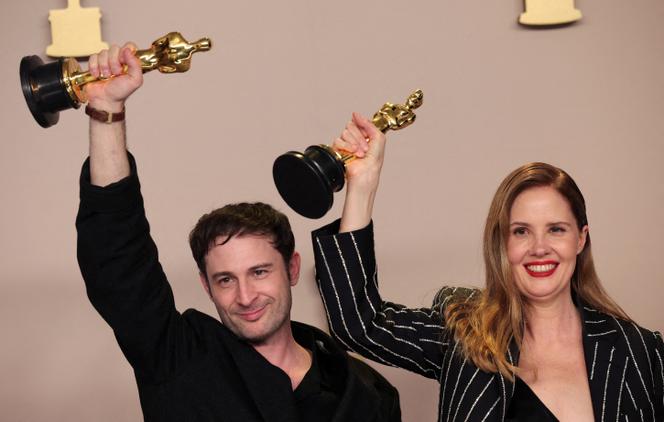
In adapted screenplay, where Barbie was nominated – and where some suspected Greta Gerwig would win after being overlooked for director – the Oscar went to Cord Jefferson, who wrote and directed his feature film debut American Fiction. He pleaded for executives to take risks on young filmmakers like himself. "Instead of making a $200 million movie, try making 20 $10 million movies," said Jefferson, previously an award-winning TV writer.
The Oscars belonged largely to theatrical-first films. Though it came into the awards with 19 nominations, Netflix was a bit player. Its lone win came for live-action short: Wes Anderson's The Wonderful Story of Henry Sugar, based on the story by Roald Dahl.
Last year's ceremony, where a very different best-picture contender in Everything Everywhere All at Once triumphed, was watched by 18.7 million people, up 12% from the year prior. ABC and the academy are hoping to continue the upward trend after a nadir in 2021, when 9.85 million watched a pandemic-diminished telecast relocated to Los Angeles' Union Station.
